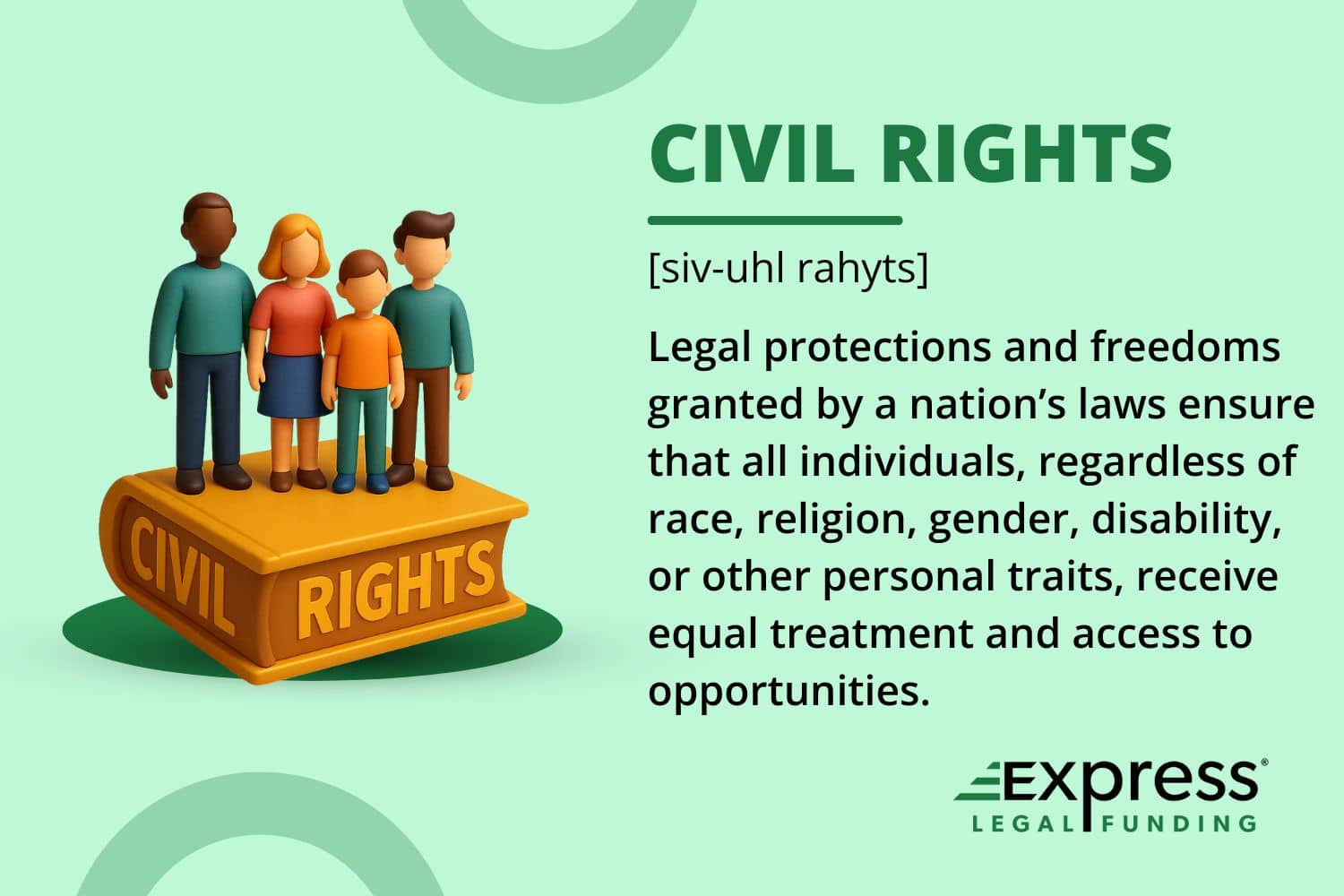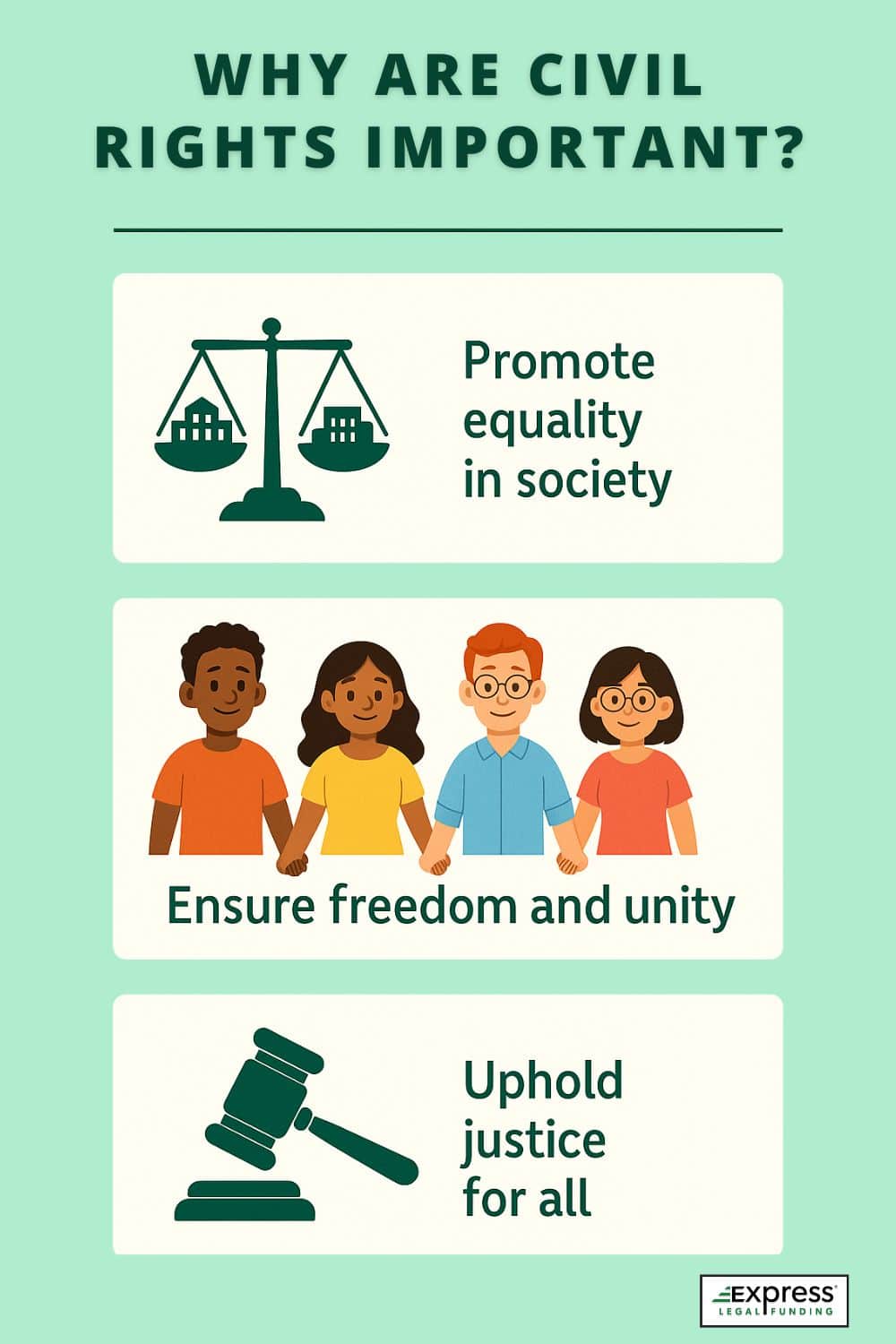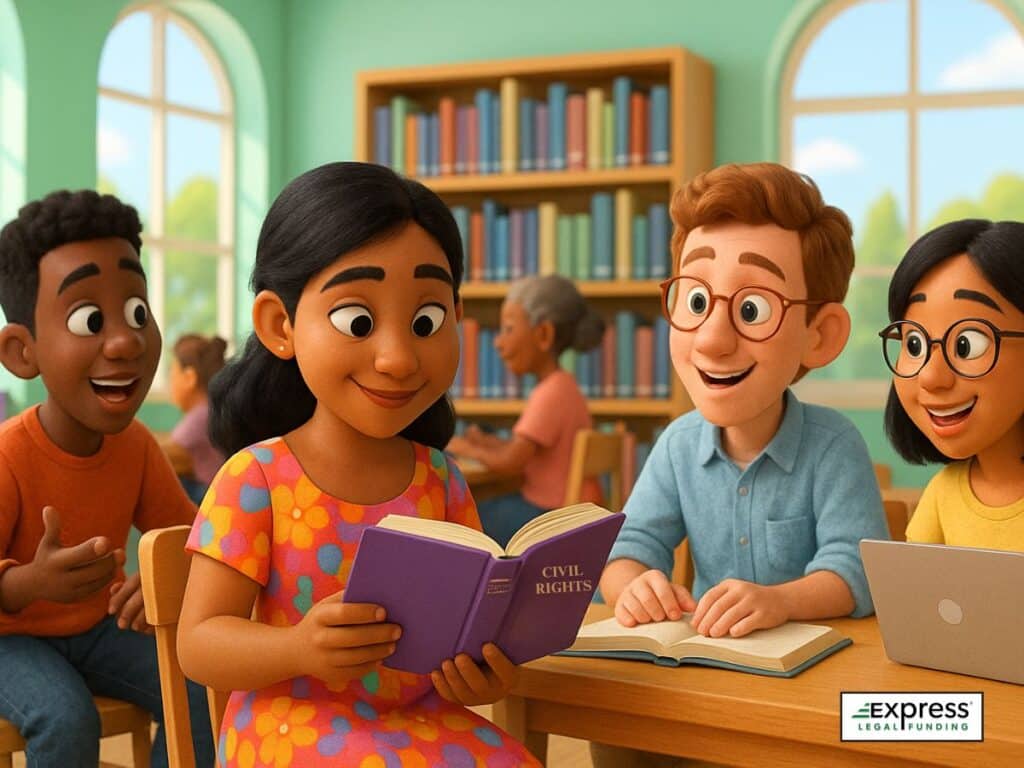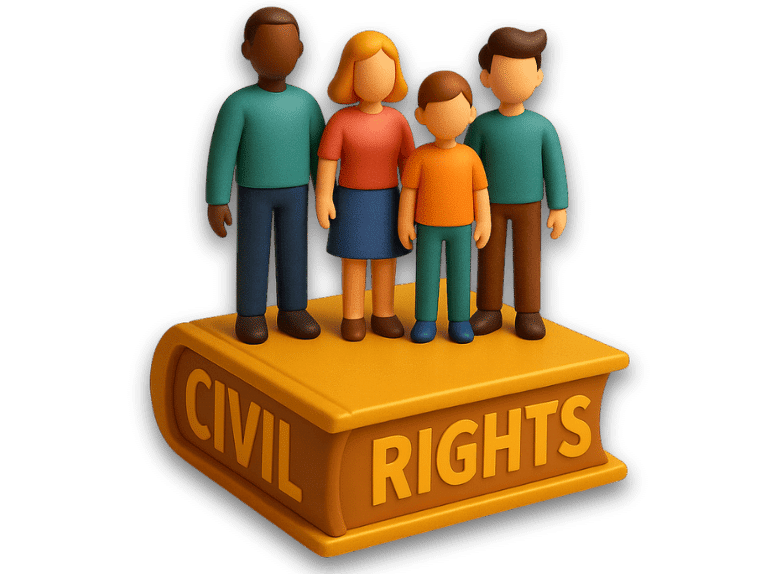Civil rights are the legal protections that guarantee fair and equal treatment for all individuals under the law. They shield people from discrimination and ensure access to fundamental opportunities like voting, education, employment, and housing, regardless of race, gender, religion, or background.
By upholding civil rights, societies promote equality, inclusion, and justice for everyone.
In this glossary guide, we answer the most commonly asked questions about civil rights—what they are, why they matter, who they protect, and how they’re enforced.
What Are Civil Rights?
Civil rights are personal freedoms and protections that are guaranteed by law. These rights ensure equal treatment and access to opportunities in areas like voting, education, employment, and housing. Civil rights laws are designed to protect individuals from unfair treatment based on characteristics such as race, religion, sex, national origin, age, or disability.

In the United States, civil rights protect everyone—citizens and non-citizens alike—from discrimination and unequal treatment under the law. They play a vital role in helping all people participate fully in society.
What Is the Main Purpose of Civil Rights?
The main purpose of civil rights is to ensure that all people are treated equally and fairly under the law. Civil rights help break down discriminatory barriers and ensure all individuals can fully engage in public, economic, and political life.
Why Are Civil Rights Important?
Civil rights are essential to a fair, inclusive, and democratic society. They:

- Ensure everyone can participate in civic life
- Protect against discrimination and systemic injustice
- Promote social stability by guaranteeing fair treatment
- Help prevent one group from dominating others based on race, gender, or background
Without civil rights protections, people could be denied jobs, housing, education, or voting rights based solely on who they are. Enforcing these rights builds trust in the legal system and allows all members of society to thrive equally.
What Is the Difference Between Civil Rights and Civil Liberties?
Civil rights and civil liberties are both essential, but they serve different purposes:
- Civil liberties protect individual freedoms from government interference. Examples include freedom of speech, religion, and privacy.
- Civil rights guarantee equal treatment and opportunity under the law. They require government action to ensure fairness and prevent discrimination.
For example:
- The right to vote is a civil right—it requires the government to ensure equal access to elections.
- The right to free speech is a civil liberty—it limits what the government can do to restrict expression.
In short, civil liberties are about freedom; civil rights are about equality.
What Are Some Examples of Civil Rights?
Civil rights include key freedoms that promote equality and protect against discrimination. The table below outlines some of the most important examples:
Examples of Civil Rights
| Civil Right | Description |
|---|---|
| Right to vote (suffrage) | The right to take part in elections without facing discrimination. Every eligible citizen’s vote counts equally. |
| Right to vote free from intimidation | Protects voters from threats, coercion, or harassment while registering or casting a ballot. Ensures elections are fair and accessible. |
| Right to a fair trial | The right to due process and equal treatment in the justice system, including access to a fair and impartial trial. |
| Right to public education | The right to attend public schools regardless of race, ethnicity, or national origin. |
| Equal access to public facilities | The right to use public places (parks, transit, restaurants, etc.) without segregation or discrimination. |
| Right to equal employment opportunities | Protects individuals from discrimination in hiring, promotion, pay, or termination based on race, sex, religion, disability, or other protected traits. |
| Freedom from discrimination | The right to equal treatment in work, housing, healthcare, and other areas, regardless of protected traits. |
These rights ensure everyone has the same access to education, justice, public spaces, and civic participation, regardless of background or identity.
Where Do Civil Rights Come From?
Civil rights come from a combination of legal systems, political movements, and evolving ideas about justice and equality. Historically, civil rights have been established through laws, constitutions, court decisions, and international agreements that recognize the need to protect individuals from discrimination and unequal treatment.
While specific civil rights vary by country, many are rooted in global movements for freedom, democracy, and human dignity. Key historical sources include:
- Constitutional frameworks (e.g., U.S. Constitution, French Declaration of the Rights of Man and of the Citizen)
- Legal reforms following major political revolutions or regime changes
- Civil rights movements, which pressured governments to expand protections
- International agreements like the Universal Declaration of Human Rights (1948), which influenced civil rights laws worldwide
In modern societies, civil rights are typically granted and enforced by governments and reflect a nation’s commitment to ensuring fairness, equality, and participation in civic life. However, they often evolve through struggle, won by individuals and groups who demand equal treatment under the law.
Are Civil Rights the Same in Every Country?
No, civil rights are not the same in every country. While many nations recognize basic principles like equality and non-discrimination, the specific rights protected—and how they’re enforced—vary widely depending on a country’s laws, constitution, and political system. Some countries offer broad civil rights protections, while others may limit rights based on religion, gender, political affiliation, or citizenship.
International agreements like the Universal Declaration of Human Rights influence civil rights globally, but enforcement remains largely national.
What Are the Civil Rights Protected by the U.S. Constitution?
The U.S. Constitution protects key civil rights that ensure fairness and equality for all people. These include the right to equal protection under the law, freedom from discrimination, and the right to vote. Major protections come from the:
- 13th Amendment (abolishing slavery)
- 14th Amendment (guaranteeing equal protection)
- 15th Amendment (protecting voting rights regardless of race)
While the Bill of Rights protects individual liberties (like free speech and religion), civil rights focus on equality and protection from discrimination. However, when these freedoms are unequally applied or denied to specific groups, they can become civil rights issues.
Are Civil Rights Only for U.S. Citizens?
No, civil rights in the United States are not limited to U.S. citizens. Many civil rights protections apply to all people within the country’s borders, including permanent residents, visa holders, and undocumented individuals.
For example, the right to equal protection under the law and freedom from discrimination are guaranteed to “any person” under the 14th Amendment, not just citizens. However, some rights, such as voting in federal elections, are reserved specifically for U.S. citizens.
Who Is Protected Under Civil Rights Laws?

Civil rights laws are designed to protect people from discrimination based on certain protected characteristics, also known as protected classes. These include:
- Race
- Color
- Religion
- Sex (including pregnancy and, in many cases, sexual orientation and gender identity)
- National origin
- Age (typically 40 and older, under federal law)
- Disability
- Genetic information (under specific federal protections like GINA)
These protections apply in areas such as employment, education, housing, public accommodations, and voting. While federal laws set a baseline for civil rights protections, some states expand these protections to cover additional groups or offer stronger enforcement.
Discriminating against someone based on a protected class may violate civil rights laws and could lead to legal action or government enforcement.
Are LGBTQ+ Rights Considered Civil Rights?
Yes, LGBTQ+ rights are considered civil rights. They involve legal protections that ensure individuals are not discriminated against based on sexual orientation or gender identity. These rights include equal access to employment, housing, healthcare, public accommodations, and the ability to marry or adopt.
In the U.S., several federal and state laws recognize LGBTQ+ protections as part of broader civil rights laws.
In 2020, the Supreme Court ruled in Bostock v. Clayton County that it’s illegal to fire someone for being gay or transgender under the Civil Rights Act.
What Are Women’s Civil Rights?
Women’s civil rights are the legal protections that ensure women are treated equally under the law and have the same opportunities as men in areas like voting, employment, education, and healthcare.
These rights protect women from discrimination based on sex or gender and are enforced through laws such as:
- The Equal Pay Act of 1963: requires equal pay for equal work.
- Title VII of the Civil Rights Act of 1964: prohibits sex-based discrimination in employment.
- Title IX of the Education Amendments of 1972: bans sex discrimination in federally funded education programs.
- The Pregnancy Discrimination Act: protects against workplace discrimination due to pregnancy or childbirth.
- The Violence Against Women Act (VAWA): provides support and legal remedies for survivors of gender-based violence.
These laws, along with constitutional protections, help ensure women can fully participate in civic, economic, and social life without facing bias or unfair treatment.
How Do Civil Rights Differ by State?
While federal civil rights laws set the minimum level of protection nationwide, individual states can expand those rights even further. Many states have passed their own civil rights laws that:
- Offer broader protections beyond federal standards
- Cover additional groups, such as sexual orientation, gender identity, or marital status
- Apply to more areas, like state-funded programs, small businesses, or public services not covered by federal law
For example, some states prohibit discrimination based on sexual orientation or gender identity, even though these protections are not fully guaranteed under all federal laws. This means that civil rights vary depending on where you live, and state laws may provide stronger or more specific safeguards than federal laws alone.
What Happens If Someone’s Civil Rights Are Violated?
If someone’s civil rights are violated, they may have the right to file a complaint with a government agency or take legal action in court. Depending on the situation, they could seek compensation, policy changes, or justice through civil rights lawsuits.
Government agencies like the U.S. Department of Justice (DOJ), specifically through its Civil Rights Division, have the authority to investigate and enforce civil rights laws, including through criminal litigation in certain cases.
Can You Sue for Civil Rights Violations?
Yes, you can sue for civil rights violations. If your rights were violated, such as through discrimination, excessive force, or unequal treatment by a government official, you may file a lawsuit in state or federal court. Many civil rights claims are brought under Section 1983, which allows individuals to sue government actors for violating their constitutional rights.
Other claims may fall under federal laws like the Civil Rights Act. Victims can seek remedies such as financial compensation, injunctions to stop unlawful practices, and court orders to enforce policy changes.
Can Civil Rights be Taken Away?
Yes, certain civil rights—such as the right to vote, serve on a jury, or hold public office—can be taken away, most often after a felony conviction. The loss of rights depends on state law and may be temporary or permanent. In some cases, individuals can restore their rights through expungement, pardons, or other legal processes. Any removal must follow due process and be authorized by law.
What Are Examples of Civil Rights Violations?
Civil rights violations occur when a person is unfairly treated or denied equal access based on protected characteristics like race, gender, religion, or disability. Common examples include:
- Being denied a job or promotion due to race or gender
- Police misconduct or excessive force without justification
- Refusal to rent or sell housing based on religion
- Voter suppression or intimidation
- Unequal access to education or public services
These violations go against laws that protect individuals from discrimination and ensure equal treatment under the law.
What Was the Civil Rights Movement?
The Civil Rights Movement was a major social and political movement in the U.S. during the 1950s and 1960s. Its goal was to end racial segregation and secure equal rights for African Americans.
Activists used nonviolent methods like marches, sit-ins, and court challenges to fight discriminatory laws and practices. Despite facing violence and resistance, the movement led to landmark changes, including:
- The Civil Rights Act of 1964 banned segregation and discrimination in public places and employment.
- The Voting Rights Act of 1965 removed barriers that had prevented Black Americans from voting.
This movement helped dismantle Jim Crow laws and created lasting change in American law and society. It also inspired future civil rights campaigns for gender equality, disability rights, LGBTQ+ rights, and more.

